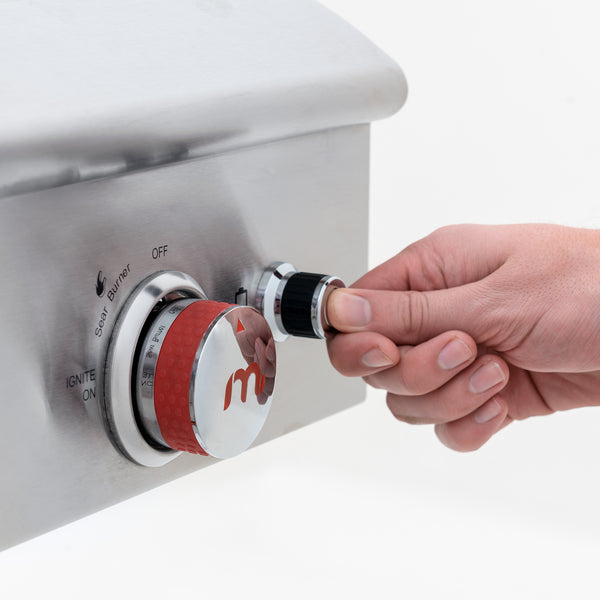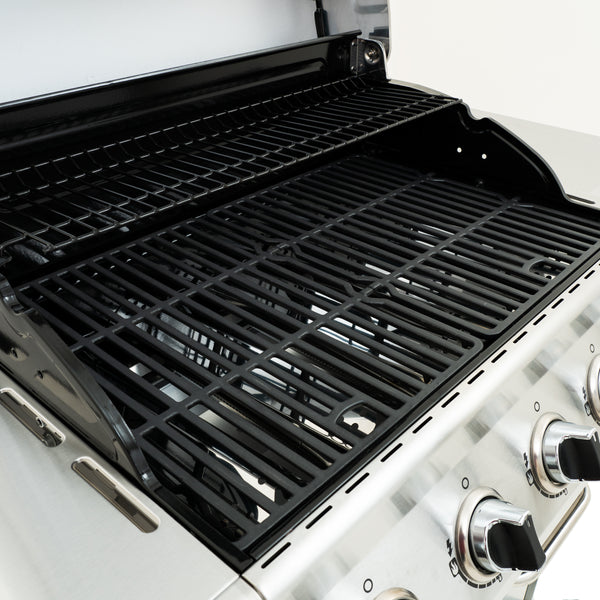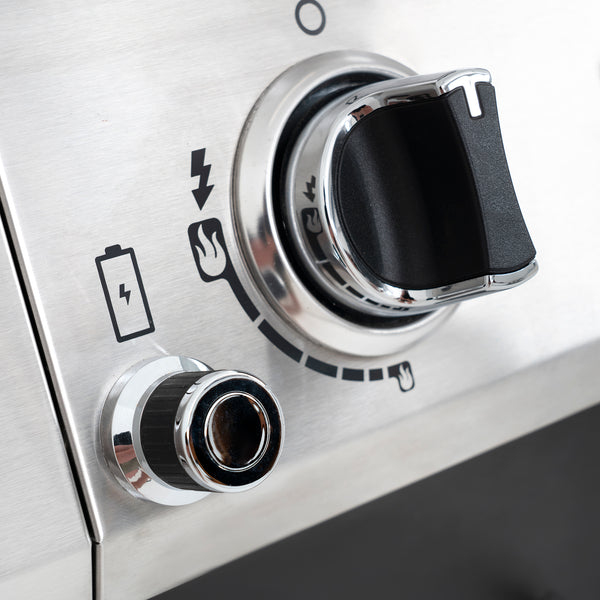Natural Gas vs. Propane. What’s the Difference?
You love grilling. It's what you do.And you’re not alone. Did you know that, in the U.S., 75 percent of adults own a gas grill, and 63 percent use it year-round? Yes, grilling is a serious business. Yet, many avid grillers are debating the use of natural gas vs. propane when it comes to their favorite pastime.
How does natural gas compare to propane when it comes to food’s taste or flavor? What is the cost of natural gas compared to propane? If natural gas and propane both get the grilling job done, does it really matter which one you use?
Read on to explore some of the key questions about grilling with either natural gas or propane.

Where Do Natural Gas & Propane Come From?
Natural gas is a fossil fuel extracted from the earth. It is an energy source that is odorless, colorless, and non-toxic. Natural gas is also a clean-burning gas made of 70-90 percent methane.Propane is a non-toxic, colorless, odorless gas. It is a by-product of natural gas processing and crude oil refinement. Liquid propane is formed when this gas is pressurized in a container.
When it comes to supply, natural gas is all taken care of by the experts; you don't have to do anything but connect your grill to a pre-existing gas line at home.
Propane gas requires a bit more effort. You can transport empty propane tanks to the gas station to swap them out for full ones, and in some cases schedule refills for your empty liquid propane tank. You will also need storage space to store your portable liquid propane gas tanks.
Natural Gas vs. Propane - Which Is Better for Grilling?
When it comes to grilling with either propane or natural gas, it is all a matter of personal preference. Are you a camping-obsessed, grilling nomad who is always on the move? Or are you a homebody who likes to keep your cookouts closer to home?The quickest and most common way to set up your grill for cooking is with a liquid propane tank. It’s also the most portable option, as many liquid propane tanks are available in 20 lb. and 16-ounce options.
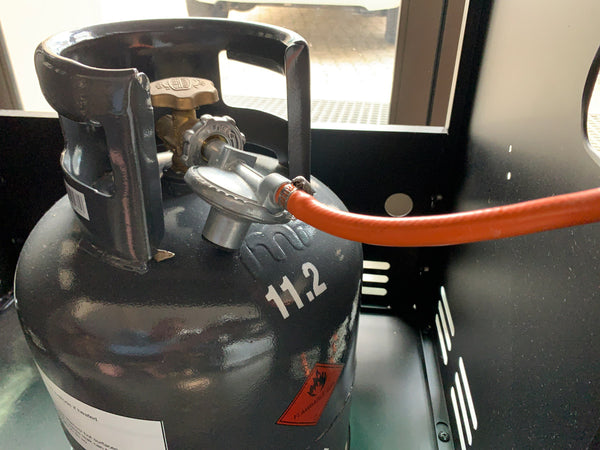
On the other hand, grills set up for natural gas will connect to a home’s gas lines. These gas lines are immovable and part of the property’s utilities. So, if you prefer your grilling close to home, then natural gas might be the best option for you.
Natural Gas vs. Propane - Which Is Greener?
The short answer? Propane.Both propane and natural gas are clean-burning fuels, but propane is a green, eco-friendly fuel which is non-toxic and insoluble in water. It is denser than air, causing it to lay low in the atmosphere, dissipating more slowly (a good thing!). Propane gas is also non-toxic, colorless, and odorless.
As a fossil fuel, natural gas is a non-renewable energy source. It’s mostly comprised of methane, a greenhouse gas that negatively impacts the environment, making natural gas less environmentally friendly. Natural gas is lighter than air, so it rises into the atmosphere and dissipates quicker than propane.
Natural Gas vs. Propane – Some Pros & Cons
There are advantages and disadvantages to using either natural gas or propane to fuel your gas grill. Based on what you will learn in this article, you’ll be able to make an informed decision as to which option is best for you.Natural Gas - An Unlimited Supply, But Fixed in One Place
When using natural gas, you’ll be tapping into a utility, which will provide you with gas supply anytime you need it. If you are a Memorial Day, 4th of July, or Labor Day grill master who likes to host hungry friends and neighbors at your place for mega-cookouts, then grilling with natural gas could be the way to go.Propane Gas – The Portable Fuel Option
When put under pressure, such as inside a propane tank, propane gas turns into liquid propane. This makes it conveniently transportable to places where a natural gas utility cannot reach. So, if you’re an adventurous traveler who likes to grill on-the-go, grilling with portable liquid propane would be a better option for you.Another advantage of grilling with propane gas is that it emits odorless and lower-carbon dioxide emissions, making it a “cleaner-burning” option for gas grilling.
Is Propane Cheaper Than Natural Gas?
Propane is more expensive than natural gas, but it is also more efficient. Therefore, less is more when using propane.Natural gas is cheaper than propane, but with gas line peaks and surges, the pressure for natural gas is reduced. This means it will take your grill longer to heat up when fueled by natural gas.
Cost considerations also depend on where you live as well as your lifestyle. Do you need to use a lot of fuel? Do you live in the city or out in the country?
Also keep in mind that natural gas burns longer than propane, resulting in less overall usage and lower costs. If you do most of your grilling at home, then plugging into a main gas line will save you money in the long run.
If you regularly go camping or hiking, portable liquid propane is the obvious way to go. If you live in a rural area, propane will be your best bet, as connecting to a city’s main gas lines will be expensive, if not impossible.
However, if you do a lot of entertaining at home, it may be worth the investment to install natural gas connections in your house.

Propane or Natural Gas? – Comparing the Costs
When it comes to picking a fuel source for your gas grill, a cost analysis might be useful. To decide which option best fits your budget, you’ll need to know your monthly gas usage.If you’re considering natural gas but aren't connected to a main gas line, you’ll need to weigh the cost of installing one in your house. It may be expensive at the outset, but the costs saved over time could be cheaper in the long run.
If you do decide to set up your residence to cook with natural gas, be prepared for not just initial upfront cost, but also for some potential trench-digging in your yard in order to get you connected to your local natural gas utility.
If it's just the costs of fuel you’re considering, then connecting to a natural gas grid may not be worth the investment.
In this case, you might want to consider investing in a natural gas conversion kit, as this option will give you the best of both worlds.
Find a natural gas converter kit for your gas grill on mygrillparts.com
Natural Gas vs. Propane – Which burns hotter?
Propane contains more carbon than natural gas and can therefore burn up to three times hotter.However, natural gas burners compensate for this difference in temperature with larger orifices that let an adequate amount of gas through. Compared to propane, natural gas burns cooler, cleaner and longer.
Some gas grillers prefer using natural gas because it heats slower, allowing them time to cook delicate proteins, like fish, before the grill gets too hot.
Natural Gas vs. Propane – Which Gives the Best Flavor?
The taste of your grilled foods will be the same, whether you use propane or natural gas. So, the choice is entirely up to you.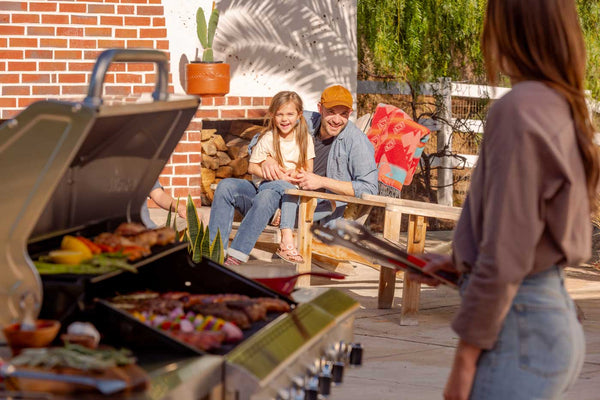
Natural Gas vs. Propane - Which Is Safer?
Both natural gas and propane are highly flammable. This means both types of gas can quickly ignite from a small spark or flame to cause an explosion. Extreme care and caution should always be exercised when using either type of gas for your grill.If you are concerned about the safety of using natural gas to fuel your backyard cookouts, rest assured that it is perfectly safe. The distribution of natural gas for home gas grilling is well regulated, and its pressure has been sufficiently reduced by the time it reaches your house.
Grilling With Propane & Natural Gas – General Safety Tips
When it comes to gas grilling, it is better to be overly cautious than too relaxed or careless. Here are some general safety tips for grilling with gas:- Always use a natural or propane gas grill outside; never indoors.
- Always contract professional technicians experienced in working with natural or propane gas to install your appliances, connect you to gas mains, and check for leaks.
- Never store portable liquid propane tanks in vehicles, basements, or interior living areas.
- Always secure portable liquid propane tanks during transport, or when using them to heat your house, boil water, or for gas grilling.
Natural Gas vs. Propane - Detecting Gas Leaks
Gas leaks can cause untold harm.Both propane and natural gas are odorless, so how would your nose detect if there’s a leak? To assist you in detecting gas leaks, mercaptan (a harmless odorous gas that smells like rotten eggs) is added to propane and natural gas. Gas leaks are dangerous as they can cause fiery explosions, resulting in personal injury and devastating damage to property. If inhaled, both propane and natural gas can cause dizziness, lightheadedness, headaches, nausea, or even death.
If you hear a hissing sound near your liquid propane tank or the gas line in your house, this could be an indication of a gas leak.
If you suspect you have a gas leak, turn off any open flames and extinguish all smoking materials. Then, get out of the house and as far away from the propane tank as quickly as possible.
If safe to do so, first shut off the gas valve on your liquid propane tank or main gas line before making your escape.
Once you are safely outside and far away from the gas leak, contact your gas supplier, the fire department, or call 911.
Natural Gas Conversion Kits – Why & How To Use Them
If you like the affordability and stability of a natural gas grill but also like to head out to the countryside for some al fresco gas grilling occasionally, it might make sense for you to invest in a natural gas conversion kit.With a natural gas conversion kit, you can have your steak and eat it too, as it will transform your dual-energy gas grill (fueled by propane) into a stationary, natural gas grill, allowing you to take advantage of inexpensive natural gas by tapping into a gas grid.
When you're ready to go road tripping, simply undo the natural gas conversion, and grill on-the-go using propane gas. The ease and convenience of using a natural gas conversion kit really makes it possible to enjoy any grilling lifestyle you desire.
Find a natural gas conversion kit for your gas grill on mygrillparts.com
Installing a Natural Gas Conversion Kit
When installing a natural gas conversion kit, remember to always follow your grill manufacturer’s instructions for this process to the letter. It is very important to always ensure that your grill is disconnected from your home's electrical outlets and gas mains before starting this installation process.Once installed, check to be sure your natural gas conversion kit's connections are tight and that there are no leaks before igniting your gas grill.
It's definitely worth ensuring that your natural gas conversion kit is installed correctly, as this will ensure not only your safety, but also give you peace of mind.
If you are unsure or in doubt about how to install your natural gas conversion kit, consult with a professional technician instead.
Important: Natural gas conversion kits are safe to use, but certain gas grill manufacturers state that using one will void their warranty. Be sure to check your owner's manual for this information before installing a natural gas conversion kit. Also, verify that your grill is a dual-energy model, is convertible to natural gas, and includes the natural gas orifices to complete the conversion.
Find a replacement natural gas conversion kit for your gas grill on mygrillparts.com
Natural Gas vs. Propane - Your Needs Will Determine Your Choice
As you can see, when it comes to making a choice between natural gas or propane for your gas grill, there are many pros and cons to consider for each option. We hope this article has been helpful in allowing you to make an informed decision.Don’t forget to have a look at all the helpful grilling accessories (including Natural Gas Conversion Kits) on mygrillparts.com.
Whether grilling with natural gas or propane, My Grill Parts has everything to get you back to grilling - fast!
